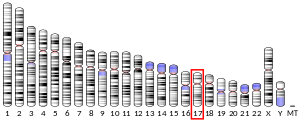RAMP2
Receptor activity modifying protein 2, also known as RAMP2, is a protein which in humans is encoded by the RAMP2 gene.[4][5]
Function
The protein encoded by this gene is a member of the RAMP family of single-transmembrane-domain proteins, called receptor (calcitonin) activity modifying proteins (RAMPs). RAMPs are type I transmembrane proteins with an extracellular N-terminus and a cytoplasmic C-terminus. RAMPs are required to transport calcitonin-receptor-like receptor (CRLR) to the plasma membrane. CRLR, a receptor with seven transmembrane domains, can function as either a calcitonin gene-related peptide (CGRP) receptor or an adrenomedullin receptor, depending on which members of the RAMP family are expressed. In the presence of this (RAMP2) protein, CRLR functions as an adrenomedullin receptor. The RAMP2 protein is involved in core glycosylation and transportation of adrenomedullin receptor to the cell surface.[4]
References
- GRCh38: Ensembl release 89: ENSG00000131477 - Ensembl, May 2017
- "Human PubMed Reference:". National Center for Biotechnology Information, U.S. National Library of Medicine.
- "Mouse PubMed Reference:". National Center for Biotechnology Information, U.S. National Library of Medicine.
- "Entrez Gene: RAMP2".
- McLatchie LM, Fraser NJ, Main MJ, Wise A, Brown J, Thompson N, Solari R, Lee MG, Foord SM (May 1998). "RAMPs regulate the transport and ligand specificity of the calcitonin-receptor-like receptor". Nature. 393 (6683): 333–9. doi:10.1038/30666. PMID 9620797.
Further reading
- Ichikawa-Shindo Y, Sakurai T, Kamiyoshi A, Kawate H, Iinuma N, Yoshizawa T, Koyama T, Fukuchi J, Iimuro S, Moriyama N, Kawakami H, Murata T, Kangawa K, Nagai R, Shindo T (January 2008). "The GPCR modulator protein RAMP2 is essential for angiogenesis and vascular integrity". The Journal of Clinical Investigation. 118 (1): 29–39. doi:10.1172/JCI33022. PMC 2147670. PMID 18097473.
- Fritz-Six KL, Dunworth WP, Li M, Caron KM (January 2008). "Adrenomedullin signaling is necessary for murine lymphatic vascular development". The Journal of Clinical Investigation. 118 (1): 40–50. doi:10.1172/JCI33302. PMC 2147672. PMID 18097475.
- Kuwasako K, Kitamura K, Nagata S, Kato J (2008). "Functions of the extracellular histidine residues of receptor activity-modifying proteins vary within adrenomedullin receptors". Biochem. Biophys. Res. Commun. 377 (1): 109–13. doi:10.1016/j.bbrc.2008.09.105. PMID 18835256.
- Oliver KR, Wainwright A, Edvinsson L, et al. (2002). "Immunohistochemical localization of calcitonin receptor-like receptor and receptor activity-modifying proteins in the human cerebral vasculature". J. Cereb. Blood Flow Metab. 22 (5): 620–9. doi:10.1097/00004647-200205000-00014. PMID 11973435.
- Christopoulos A, Christopoulos G, Morfis M, et al. (2003). "Novel receptor partners and function of receptor activity-modifying proteins". J. Biol. Chem. 278 (5): 3293–7. doi:10.1074/jbc.C200629200. PMID 12446722.
- Dumont CE, Muff R, Flühmann B, et al. (2002). "Paracrine/autocrine function of adrenomedullin in peripheral nerves of rats". Brain Res. 955 (1–2): 64–71. doi:10.1016/S0006-8993(02)03365-6. PMID 12419522.
- Kuwasako K, Cao YN, Nagoshi Y, et al. (2004). "Characterization of the human calcitonin gene-related peptide receptor subtypes associated with receptor activity-modifying proteins". Mol. Pharmacol. 65 (1): 207–13. doi:10.1124/mol.65.1.207. PMID 14722252.
- Nagoshi Y, Kuwasako K, Cao YN, et al. (2004). "Tumor necrosis factor-alpha downregulates adrenomedullin receptors in human coronary artery smooth muscle cells". Peptides. 25 (7): 1115–21. doi:10.1016/j.peptides.2004.04.010. PMID 15245870.
- Kuwasako K, Kitamura K, Nagoshi Y, Eto T (2003). "Novel calcitonin-(8-32)-sensitive adrenomedullin receptors derived from co-expression of calcitonin receptor with receptor activity-modifying proteins". Biochem. Biophys. Res. Commun. 301 (2): 460–4. doi:10.1016/S0006-291X(02)03072-3. PMID 12565884.
- Wang YF, Zhang J, Li J, et al. (2004). "[Increased atria expression of receptor activity-modifying proteins in heart failure patients]". Zhonghua Yi Xue Yi Chuan Xue Za Zhi. 21 (4): 351–4. PMID 15300632.
- Foord SM, Marshall FH (1999). "RAMPs: accessory proteins for seven transmembrane domain receptors". Trends Pharmacol. Sci. 20 (5): 184–7. doi:10.1016/S0165-6147(99)01347-4. PMID 10354609.
- Prado MA, Evans-Bain B, Oliver KR, Dickerson IM (2001). "The role of the CGRP-receptor component protein (RCP) in adrenomedullin receptor signal transduction". Peptides. 22 (11): 1773–81. doi:10.1016/S0196-9781(01)00517-4. PMID 11754963.
- Bomberger JM, Parameswaran N, Hall CS, et al. (2005). "Novel function for receptor activity-modifying proteins (RAMPs) in post-endocytic receptor trafficking". J. Biol. Chem. 280 (10): 9297–307. doi:10.1074/jbc.M413786200. PMID 15613468.
- Udawela M, Christopoulos G, Tilakaratne N, et al. (2006). "Distinct receptor activity-modifying protein domains differentially modulate interaction with calcitonin receptors". Mol. Pharmacol. 69 (6): 1984–9. doi:10.1124/mol.105.021915. PMID 16531504.
- Aiyar N, Disa J, Ao Z, et al. (2002). "Molecular cloning and pharmacological characterization of bovine calcitonin receptor-like receptor from bovine aortic endothelial cells". Biochem. Pharmacol. 63 (11): 1949–59. doi:10.1016/S0006-2952(02)00990-5. PMID 12093471.
- Kuwasako K, Cao YN, Chu CP, et al. (2006). "Functions of the cytoplasmic tails of the human receptor activity-modifying protein components of calcitonin gene-related peptide and adrenomedullin receptors". J. Biol. Chem. 281 (11): 7205–13. doi:10.1074/jbc.M511147200. PMID 16410241.
- Gerhard DS, Wagner L, Feingold EA, et al. (2004). "The status, quality, and expansion of the NIH full-length cDNA project: the Mammalian Gene Collection (MGC)". Genome Res. 14 (10B): 2121–7. doi:10.1101/gr.2596504. PMC 528928. PMID 15489334.
- Strausberg RL, Feingold EA, Grouse LH, et al. (2002). "Generation and initial analysis of more than 15,000 full-length human and mouse cDNA sequences". Proc. Natl. Acad. Sci. U.S.A. 99 (26): 16899–903. doi:10.1073/pnas.242603899. PMC 139241. PMID 12477932.
- Yue W, Dacic S, Sun Q, et al. (2007). "Frequent inactivation of RAMP2, EFEMP1 and Dutt1 in lung cancer by promoter hypermethylation". Clin. Cancer Res. 13 (15 Pt 1): 4336–44. doi:10.1158/1078-0432.CCR-07-0015. PMID 17671114.
- Udawela M, Christopoulos G, Morfis M, et al. (2006). "A critical role for the short intracellular C terminus in receptor activity-modifying protein function". Mol. Pharmacol. 70 (5): 1750–60. doi:10.1124/mol.106.024257. PMID 16912219.
- Michou L, Garnier S, Barbet S, et al. (2008). "Lack of linkage and association of adrenomedullin and its receptor genes in French Caucasian rheumatoid arthritis trio families". Clin. Exp. Rheumatol. 26 (6): 1083–6. PMID 19210874.
- Qi T, Christopoulos G, Bailey RJ, et al. (2008). "Identification of N-terminal receptor activity-modifying protein residues important for calcitonin gene-related peptide, adrenomedullin, and amylin receptor function". Mol. Pharmacol. 74 (4): 1059–71. doi:10.1124/mol.108.047142. PMID 18593822.
External links
- RAMP2 human gene location in the UCSC Genome Browser.
- RAMP2 human gene details in the UCSC Genome Browser.
This article incorporates text from the United States National Library of Medicine, which is in the public domain.

